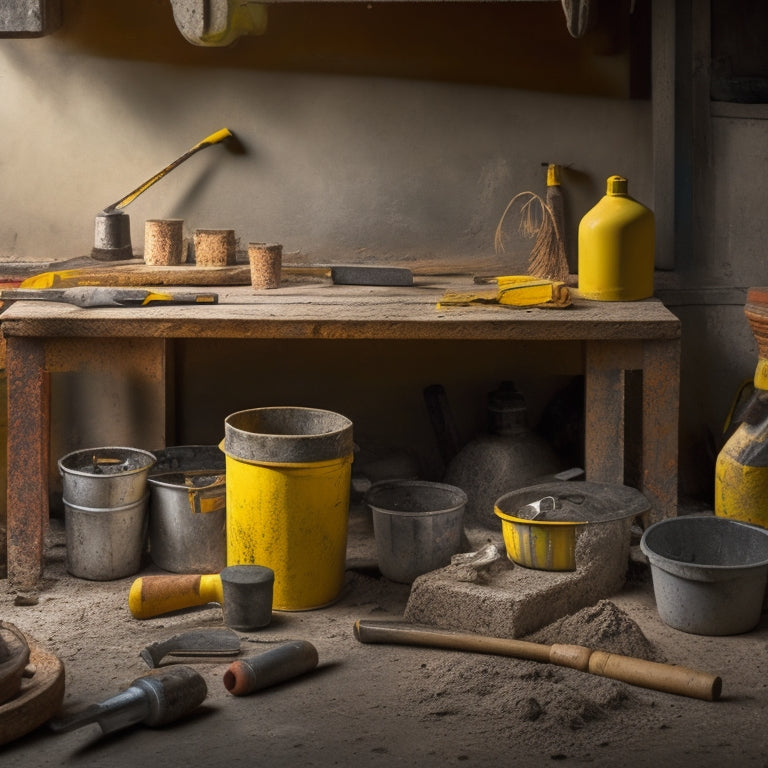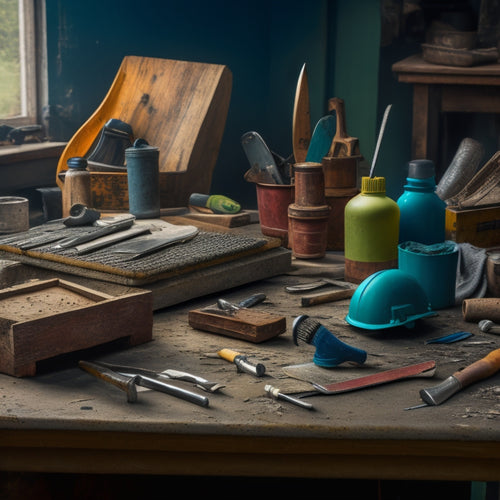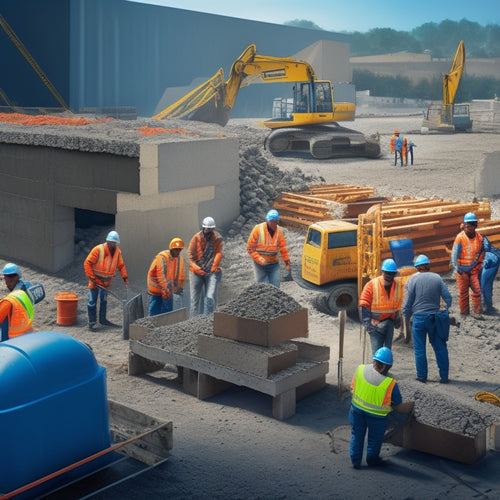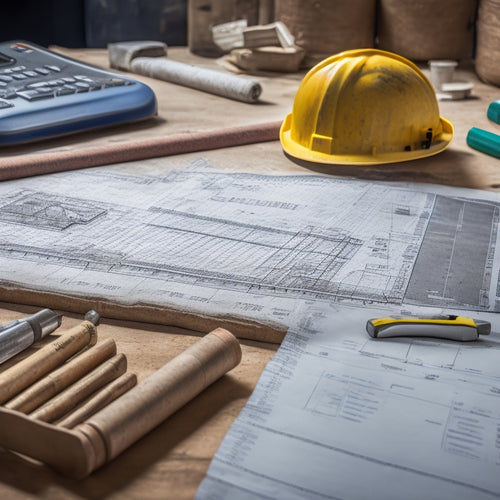
3 Best Concrete Tools for Home Projects
Share
You'll need a reliable mixing bucket or wheelbarrow, a sturdy mixing trowel or shovel, and a high-quality finishing trowel to tackle your concrete project successfully. These essentials will guarantee you're well-equipped to mix and apply concrete safely and effectively. The right mixing tools will help you achieve a consistent blend, while a finishing trowel will give you the smooth, even surface you're after. By investing in these must-haves, you'll be well on your way to a professional-looking result, and with more information, you'll be able to refine your skills and tackle even more complex projects.
Key Takeaways
• For a smooth finish, invest in a high-quality finishing trowel with a durable blade and ergonomic handle.
• A reliable mixing bucket or wheelbarrow is essential for holding and mixing concrete effectively.
• A sturdy mixing trowel or shovel is necessary for combining ingredients thoroughly and efficiently.
• Safety goggles, gloves, and a dust mask are crucial for protecting yourself from harm during concrete projects.
• Regular tool maintenance, such as cleaning and lubricating, is vital for extending the lifespan of your concrete tools.
Essential Concrete Tools for Beginners
When starting your first concrete project, you'll need a solid foundation of essential tools to guarantee a successful outcome. Concrete safety should be your top priority, and having the right tools is imperative in preventing accidents and ensuring a smooth process.
Before you begin, make sure you have a reliable pair of safety goggles, gloves, and a dust mask to protect yourself from concrete dust and debris. You'll also need a sturdy wheelbarrow or mixing bucket to handle the concrete mix. Don't forget a trusty trowel for smoothing and finishing the surface.
Regular tool maintenance is essential to extend the lifespan of your equipment and prevent malfunctions. Clean your tools thoroughly after each use, and store them in a dry place to prevent rust. Lubricate moving parts and sharpen dull blades to maintain their effectiveness.
Must-Have Tools for Concrete Mixing
With your safety gear and basic toolkit in place, you're now ready to tackle the mixing process, which requires a specific set of tools to guarantee a consistent and strong concrete batch.
When it comes to mixing, having the right tools can make all the difference in achieving the desired consistency and strength. A mixing bucket or wheelbarrow is a must-have for holding and mixing the concrete. You'll also need a mixing trowel or shovel to combine the ingredients, as well as a mixing stick or paddle to ascertain thorough mixing.
In addition to these essential tools, it's vital to incorporate proper mixing techniques to avoid inconsistencies and weak spots. This includes mixing in a well-ventilated area, wearing safety equipment such as gloves and goggles, and following the manufacturer's instructions for mixing ratios and times.
By using the right tools and techniques, you can guarantee a strong and durable concrete batch that meets your project's requirements.
Top Picks for Smoothing Finishes
What tools do you need to achieve a smooth, even finish for your concrete project, free of imperfections and blemishes? To master various smoothing techniques, you'll require the right equipment.
Finishing trowels are a top pick for achieving a flawless finish. These handheld tools allow for precision control, enabling you to feather out edges and remove excess material. Look for trowels with high-carbon steel or stainless steel blades, which provide maximum durability and resistance to corrosion.
When selecting a finishing trowel, consider the size and shape of the blade, as well as the handle material and ergonomics. A comfortable grip and balanced design will reduce fatigue and improve your overall performance.
Additionally, consider the type of concrete you're working with, as some trowels are better suited for specific mixes or applications. With the right finishing trowel in hand, you'll be well on your way to achieving a smooth, professional-looking finish for your concrete project.
Remember to always follow safety guidelines and best practices when working with power tools and concrete materials to guarantee a safe and successful project outcome.
Frequently Asked Questions
Can I Use a Regular Drill for Mixing Concrete?
When you're mixing concrete, you might wonder if you can use a regular drill. However, it's not recommended.
Regular drills aren't designed for the intense mixing required for concrete. You'll need a drill specifically designed for mixing, like a paddle mixer or a heavy-duty drill with a mixing bit.
Otherwise, you risk damaging your drill or, worse, injuring yourself. Instead, use the right drill types and mixing techniques to guarantee a safe and successful project.
How Often Should I Clean My Concrete Tools?
You're about to uncover a secret that'll extend the life of your concrete tools.
Here's the question: how often should you clean them? The answer lies in understanding the importance of cleaning frequency in tool maintenance.
After each use, wash off excess concrete to prevent hardened buildup.
Perform a deep clean every week, and store tools in a dry place to prevent rust.
Are Concrete Tools Suitable for Other Masonry Projects?
You might wonder if your concrete tools are suitable for other masonry projects. The answer is, it depends on the tool's versatility.
Many concrete tools, like trowels and floats, can be used for other masonry projects like laying brick or block.
However, some tools, like concrete mixers, are specific to concrete and shouldn't be used for other materials.
Always check the manufacturer's guidelines to verify compatibility and safety.
What Safety Gear Is Necessary for Working With Concrete?
When you're knee-deep in a concrete project, don't get caught in a pinch without the right safety gear.
You need to prioritize concrete safety to avoid injuries.
Make sure you've got the personal protective equipment (PPE) essentials: gloves, safety glasses, and a dust mask to prevent skin and eye irritation.
A hard hat and steel-toed boots will also keep you protected from falling objects and heavy tools.
Can I Rent Concrete Tools Instead of Buying Them?
You're considering renting concrete tools instead of buying them, and that's a smart move.
When you crunch the numbers, you'll find that rental options often make sense, especially for infrequent or one-time projects.
Rental advantages include reduced upfront costs and no long-term storage or maintenance worries.
Conduct cost comparisons to determine which tools are worth renting versus buying, and prioritize your safety while working with concrete.
Conclusion
As you wrap up your concrete project, remember that 'an ounce of prevention is worth a pound of cure.'
Investing in the right tools upfront can save you time, money, and frustration in the long run.
With these top picks for mixing, finishing, and smoothing, you'll be well-equipped to tackle any concrete task that comes your way.
By having the right tools, you'll guarantee a professional-looking finish and avoid costly rework.
Related Posts
-

Must-Have Handheld Tools for Concrete Repair
When tackling a concrete repair project, it is crucial to have the right handheld tools to achieve a professional fin...
-

7 Best Tools for Concrete Block Construction
You'll need a solid foundation, precise cutting, and seamless finishing to guarantee your concrete block construction...
-

5 Tips for Accurate Concrete Measurement Tools
To guarantee accurate concrete measurement, you'll want to calibrate your measuring tools regularly, choosing a frequ...


